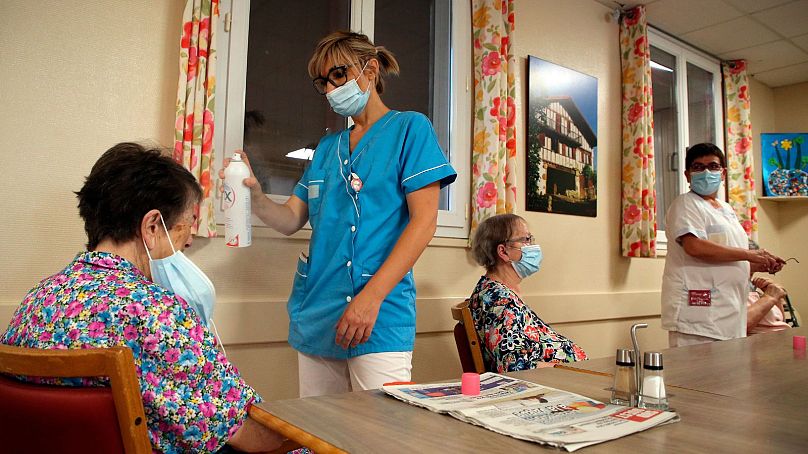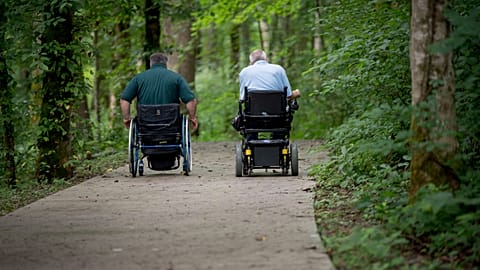Experts have found that the human body has an “upper critical temperature” of between 40C and 50C, a limit which, if surpassed, can cause it to start malfunctioning.
As Europe reported the hottest June globally on record last month - and higher temperatures still are expected for the rest of the summer - experts have found just how hot is too hot for our bodies to handle.
 ADVERTISEMENT
ADVERTISEMENT
 ADVERTISEMENT
ADVERTISEMENT
According to a recent study published by researchers at the University of Roehampton in London, the human body has an “upper critical temperature” which it can tolerate safely of between 40 and 50 degrees Celsius. After reaching this temperature, our body experiences “heat stress,” a condition which causes confusion, nausea, dizziness, headache and fainting.
The results of the study offer crucial information to protect ourselves at a time when our planet, and especially the European continent, is experiencing unprecedented temperatures.
“Temperatures in Europe have increased by about two degrees relative to pre-industrial conditions over the last few decades, and that’s somewhere around double what the global average is,” Matthew Patterson, a postdoctoral research assistant in climate physics at the University of Oxford, told Euronews Next.
“Europe is really a hot spot for climate change and increases in heat extremes. We’ve seen increases in both the frequency and intensity of heat extremes, and we’re seeing more and more record-breaking temperatures each year as a result of that warming trend. And that’s going to continue into the future as we continue to emit greenhouse gases.”
How did experts find the body’s temperature limit?
Professor Lewis Halsey, researcher at the School of Life and Health Sciences Centre at the University of Roehampton in London, and his colleagues didn’t have to endanger anyone’s safety to determine our body’s limits.
“What we were recording was an increase in metabolic rate,” Halsey said of the experiment conducted in 2021 on four men and three women. The metabolic rate measures how much energy the human body consumes to keep working.
When it’s hot outside, our body has different ways to cool down and lower its inner temperature, including sweating and flushing blood at the periphery, near the skin.
What also happens when it’s hot outside, Halsey and his colleagues found, is that our metabolic rate increases - which in turn raises the temperature of the body. But your body can only get that hot before starting to malfunction.
How hot is too hot?
According to Halsey, “everyone is different” and people’s reaction to heat can vary significantly according to their age, sex, and existing medical conditions. “Some people’s metabolic rate didn’t increase at 40 degrees, but it did so at 50 degrees,” he said.
“The body works a whole lot to defend its core temperature, it doesn’t like it changing. If it increases by one or two degrees, realistically it does not cause damage for most people,” Halsey said. “Some marathon runners have been clocked with a core temperature of 42 degrees, and that’s due to running in a hot environment.”
But even marathon runners start suffering at temperatures of 44 degrees, Halsey said - and others are not so resilient. Babies and elderly are among the most vulnerable categories to extreme heat, as the cardiovascular systems of both don’t respond well to high temperatures.
What happens when your body gets too warm?
There’s a number of things that happen when your body gets too hot, Halsey said, as extreme heat can cause your temperature to increase to a point where it generates a dangerous cascading effect which could lead to health issues and even death.
“The proteins of the body start to denature - they stop functioning, and nerve impulses don’t work as well. The nervous system is less effective, and that’s integral to the body. It would start affecting the heart, because the heart is a muscle in itself,” Halsey said.
“If that generates an arrhythmia [an abnormal heart rhythm] and the heart is not pumping blood as effectively around the body because it’s ‘out of sync’, that could cause low oxygen levels. If oxygen levels to the brain are undefended, then you’re in real trouble.”
What can we do with this information?
According to Halsey - who with his team is already working on follow-up research - the study is “building a picture about how the body responds to heat stress, how adaptable it can be, the limits to those adaptations, and - crucially - how varied responses are between individuals”.
“In a warming world, this knowledge becomes ever more valuable,” he said.
Patterson agrees -especially as we’re likely to face rising temperatures in the near-future, as emissions continue to grow instead of being cut.
“When we talk about climate change, it’s humans that we are particularly thinking of,” he said. “We’re thinking, can we live on a planet that is one degree, two degrees warmer than we’re used to? Our society is highly adapted to the climate. It’s a relatively stable climate that we've experienced over the last 10,000 years.”
By changing that, Patterson said, we’re making it harder to sustain human life the way that we’re used to.
“We very much do have the agency to stop this,” he added. “We need to stop burning fossil fuels and emit greenhouse gases. It’s very much in our hands, but we’ve got to do the work.”



















